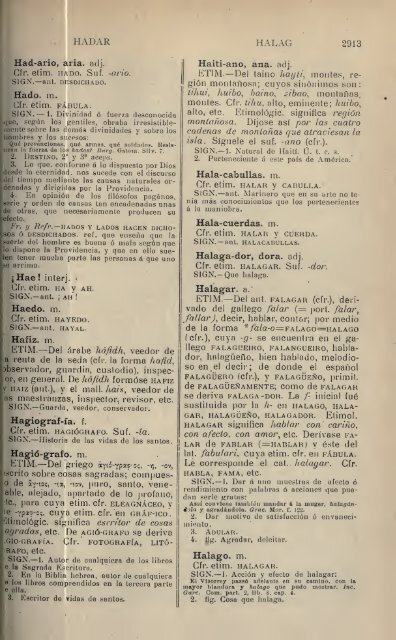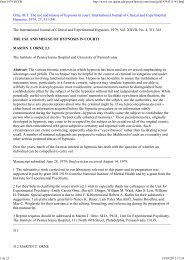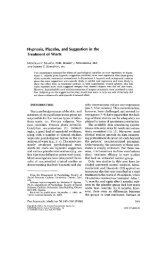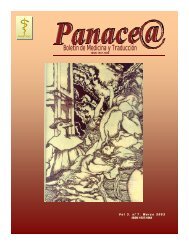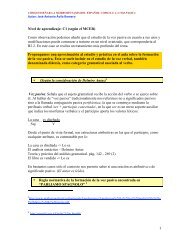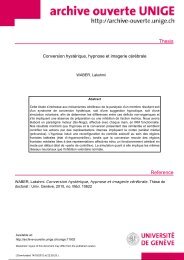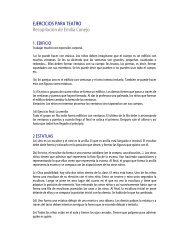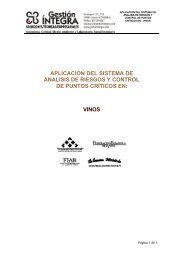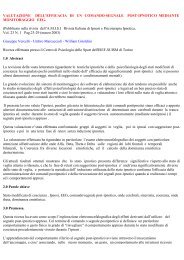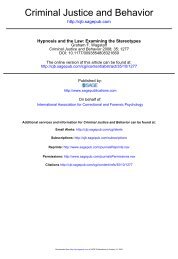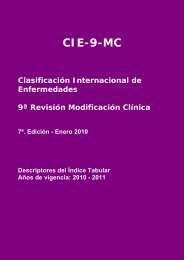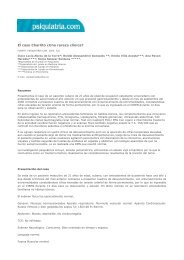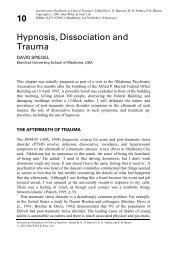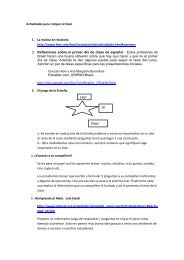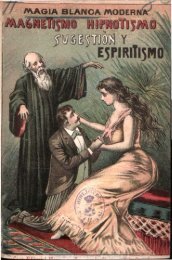Diccionario filológico-comparado de la lengua castellana
Diccionario filológico-comparado de la lengua castellana
Diccionario filológico-comparado de la lengua castellana
Create successful ePaper yourself
Turn your PDF publications into a flip-book with our unique Google optimized e-Paper software.
Had-ario, aria. adj.<br />
Cfr. etim. hado. Suf. -ario.<br />
SIGN,— ant. dicsdichado.<br />
HADAR HALAG 2913<br />
Hado. m.<br />
Cfr. etim. fábu<strong>la</strong>.<br />
SIGN. — 1. Divinir<strong>la</strong>d ó fuerza rlesconocida<br />
que, según los gentiles, obraba irresistiblemente<br />
sobre <strong>la</strong>s <strong>de</strong>más divinida<strong>de</strong>s y sóbrelos<br />
iionibres y los sucesos:<br />
Qué prevenciones, qué armas, qué soldados. Resisiirán<br />
<strong>la</strong> fuerza <strong>de</strong> los hados9 Burg. Gatom. Silv. 7.<br />
2. Destino, 2" y 3^ aceps.<br />
3. Lo (fue. conforme a lo dispuesto por Dios<br />
<strong>de</strong>s<strong>de</strong> <strong>la</strong> eternidad, nos suce<strong>de</strong> con el discurso<br />
•<strong>de</strong>l tiempo mediante <strong>la</strong>s causas naturales or<strong>de</strong>nadas<br />
y dirigidas por <strong>la</strong> Provi<strong>de</strong>ncia.<br />
4. En opinión <strong>de</strong> los filósofos paganos,<br />
serie y or<strong>de</strong>n <strong>de</strong> causas tan enca<strong>de</strong>nadas unas<br />
<strong>de</strong> otras, que necesariamente producen su<br />
efecto..<br />
Fr. 1/ Rrfr.—uAUos Y <strong>la</strong>dos hacen dichosos<br />
ó <strong>de</strong>sdichados, ref. que enseña que <strong>la</strong><br />
suerte <strong>de</strong>l hombre es buena ó ma<strong>la</strong> según que<br />
lo dispone <strong>la</strong> Provi<strong>de</strong>ncia, y que en el<strong>la</strong> suelen<br />
tener mucha parte <strong>la</strong>s personas á que uno<br />
se arrima.<br />
¡Hae ! interj. •<br />
Cfr. etim. HA y ah.<br />
SIGN. — ant. j ah !<br />
Haedo. m.<br />
Cfr. etim. hayedo.<br />
SIGN.— ant. hayal.<br />
Hafiz, m.<br />
ETIM.— Del árabe liáfidh, veedor <strong>de</strong><br />
a renta <strong>de</strong> <strong>la</strong> seda (cfr. <strong>la</strong> forma Jiafid,<br />
Dbservndor, guardia, custodio), iiispecor,<br />
en general. De háfidli formóse hafiz<br />
y haiz (ant.), y el malí, /¿a/.s, veedor <strong>de</strong><br />
as mnesti'anzas, inspector, revisor, etc.<br />
SIGN.—Guarda, veedor, conservador.<br />
Hagiograf-ía. f.<br />
Cfr. etim. hagiógrafo. Suf. -ia.<br />
SIGN.— Historia <strong>de</strong> <strong>la</strong>s vidas <strong>de</strong> los santos.<br />
Hagió-grafo. m.<br />
ETIM.— Del griego áyió-Yp^íP-oc -y;, -ov,<br />
iscrito sobre cosas sagradas; compues<strong>de</strong><br />
ív-ioí;, -,3t^ -i5v, puro, santo, veneable,<br />
alejado, a|)aita(Jo <strong>de</strong> lo profano,<br />
itc, paia cuya etim. cfr. eleagnágeo, y<br />
le -Yprf-c;, cuya etim. cfr. en gráf-ico.<br />
^timológic. significa escritor <strong>de</strong> cosas<br />
agradas, etc. De agió-grafo se <strong>de</strong>riva<br />
.gio-grafía. Cfr. fotografía, litóíRafo,<br />
etc.<br />
SIGN.— 1. Autor <strong>de</strong> cualquiera <strong>de</strong> los libros<br />
e <strong>la</strong> Sagrada líscrilura.<br />
2. En <strong>la</strong> Biblia hebrea, autor <strong>de</strong> cualquiera<br />
e los libros comprendidos en <strong>la</strong> tercera parte<br />
e el<strong>la</strong>.<br />
3. Escritor <strong>de</strong> vidas <strong>de</strong> santos.<br />
Haiti-ano, ana. adj.<br />
ETIM.— Del taino hayti, montes, región<br />
montañosa; cuyos sinónimos son:<br />
tihui, huibo, haino, ::ibao, montar<strong>la</strong>s,<br />
montes. Cfr. tihu, alto, eminente; liuibo,<br />
alto, etc. Etimológic. significa región<br />
mon<strong>la</strong>ñosa. Díjose así por <strong>la</strong>s cuatro<br />
ca<strong>de</strong>nas <strong>de</strong> montañas que atraviesan <strong>la</strong><br />
is<strong>la</strong>. Sígnele el suf. -ano (cfr.).<br />
SIGN.— 1. Natural <strong>de</strong> Haití. Ú. t. c. s.<br />
2. Perteneciente á este país <strong>de</strong> América.<br />
Ha<strong>la</strong>-cabul<strong>la</strong>s, m.<br />
Cfr. etim. ha<strong>la</strong>r y cabul<strong>la</strong>.<br />
SIGN.— aiit. Marinero que en su arte no tenía<br />
más conocimientos que los pertenecientes<br />
á <strong>la</strong> maniobra.<br />
Ha<strong>la</strong>-cuerdas, m.<br />
Cfr. etim. ha<strong>la</strong>r y cuerda.<br />
SIGN. — ant. ha<strong>la</strong>cabul<strong>la</strong>s.<br />
Ha<strong>la</strong>ga-dor, dora. adj.<br />
Cfr. etim.. ha<strong>la</strong>gar. Suf. -dor.<br />
SIGN.- Que ha<strong>la</strong>ga.<br />
Ha<strong>la</strong>gar, a.<br />
ETIM.— Del ant. fa<strong>la</strong>gar (cfr.), <strong>de</strong>rivado<br />
<strong>de</strong>l gallego fa<strong>la</strong>r {= port. fa<strong>la</strong>r,<br />
fal<strong>la</strong>r J, <strong>de</strong>cir, hab<strong>la</strong>r, conlfir; por medio<br />
<strong>de</strong> <strong>la</strong> forma */a/a-o=FALAGO=HALAGO<br />
(cfr.), cuya -g- se encuenti-a en el gallego<br />
FALAGUEIRO, FALANGUEIRO, hab<strong>la</strong>dor,<br />
ha<strong>la</strong>güeño, bien hab<strong>la</strong>do, melodioso<br />
en el <strong>de</strong>cir; <strong>de</strong> don<strong>de</strong> el español<br />
FALAGÜERo (cfi*.), y fa<strong>la</strong>güeño, primit.<br />
<strong>de</strong> fa<strong>la</strong>gljeñamente; como <strong>de</strong> fa<strong>la</strong>gar<br />
se <strong>de</strong>riva fa<strong>la</strong>ga-dor. La /- inicial fué<br />
sustituida por <strong>la</strong> h- en ha<strong>la</strong>go, ha<strong>la</strong>gar,<br />
HALAGÜEÑO, HALAGADOR. Etimol.<br />
HALAGAR significa hab<strong>la</strong>r con cariño,<br />
con afecto, con amor, etc. Derívase fa<strong>la</strong>r<br />
<strong>de</strong> PABLAR (=HABLAR) V éste <strong>de</strong>l<br />
<strong>la</strong>t. fabu/ari, cuya etim. cfr. en fábu<strong>la</strong>.<br />
Le correspon<strong>de</strong> el cat. ha<strong>la</strong>gar. Cfr.<br />
HABLA, FAMA, etC<br />
SIGN.— I. Dar á uno muestras <strong>de</strong> afecto ó<br />
rendimiento con pa<strong>la</strong>bras ó acciones que puedan<br />
serle gratas:<br />
Assí conviene también mandar á <strong>la</strong> mugen, ha<strong>la</strong>gándi<strong>la</strong><br />
y arrullándo<strong>la</strong>. Grac. Mor. f. 122.<br />
2. Dar motivo <strong>de</strong> satisfacción ó envanecimiento.<br />
H. Adu<strong>la</strong>r.<br />
4. íig. Agradar, <strong>de</strong>leitar.<br />
Ha<strong>la</strong>go, m.<br />
Cfr. etim. ha<strong>la</strong>gar.<br />
SIGN.— 1. Acción y efecto <strong>de</strong> ha<strong>la</strong>gar:<br />
El Visorrey passó a<strong>de</strong><strong>la</strong>nte en su camino, con <strong>la</strong><br />
mayor ))<strong>la</strong>ndura y ha<strong>la</strong>go que pudo mostrar. Inc.<br />
Gai-c. Com. part. 2, líb. 8, cap. 4.<br />
2. iig. Cosa que ha<strong>la</strong>ga.


